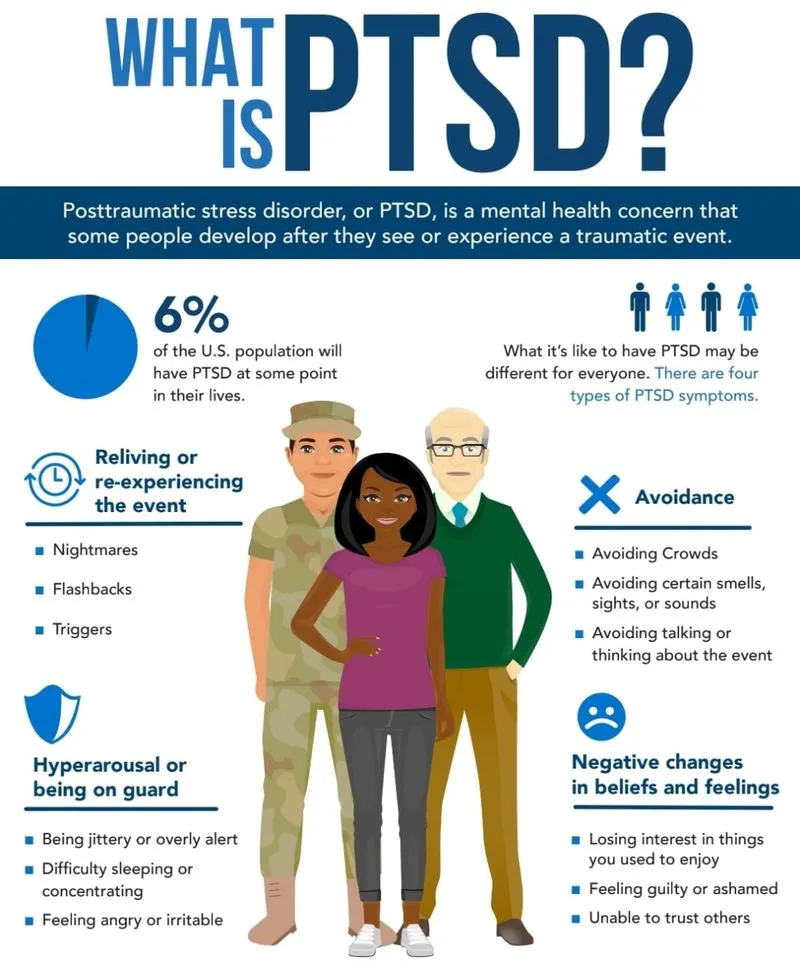Post-traumatic stress disorder (PTSD) is a mental health condition that can develop after a person experiences or witnesses a traumatic event, causing significant distress and functional impairment. It affects millions of individuals in the United States and has a significant impact on their daily lives. By understanding the causes, symptoms, and available treatment options for PTSD, we can provide support and improve the quality of life for those affected. Please note that the information provided in this blog is not a substitute for professional medical advice. If you or someone you know is experiencing symptoms of PTSD, it is essential to consult with a qualified healthcare provider or mental health specialist for an accurate diagnosis and personalized treatment plan.
Understanding PTSD
PTSD is a psychiatric disorder that can occur in individuals who have experienced or witnessed a traumatic event. These events can range from combat exposure, physical or sexual assault, natural disasters, accidents, or any situation that poses a threat to one's life or safety. It is essential to recognize that not everyone who experiences trauma will develop PTSD.
Prevalence of PTSD in the United States
PTSD is widespread in the United States, affecting people of all ages and backgrounds. According to the National Institute of Mental Health (NIMH), it is estimated that approximately 7.7 million adults in the U.S. experience PTSD in any given year. PTSD is more common in women than men, and various traumatic events, including combat, sexual assault, physical assault, natural disasters, and accidents, can cause it. Understanding the prevalence of PTSD highlights the need for awareness and support. PTSD can significantly impact a person's life, and it is important to seek professional help if you think you may have PTSD.
Causes and Risk Factors of PTSD
The development of PTSD is often associated with experiencing or witnessing a traumatic event. This can include incidents such as military combat, physical or sexual assault, accidents, or natural disasters. The intensity, duration, and proximity of the traumatic event can influence the likelihood of developing PTSD.
While exposure to trauma is a primary factor in developing PTSD, certain risk factors can increase an individual's vulnerability. These factors include a personal history of trauma, childhood adversity, pre-existing mental health conditions, lack of social support, and genetic predisposition. Understanding these risk factors helps identify individuals who may be more susceptible to PTSD.

Symptoms of PTSD
PTSD symptoms can manifest in various ways and can significantly impact an individual's daily life. Common symptoms include intense thoughts, flashbacks, nightmares, and emotional distress related to the traumatic event. Avoidance of reminders, emotional numbing, feelings of detachment, and hyperarousal (e.g., irritability, difficulty sleeping) are also prevalent symptoms.
Symptom presentation can vary across different age groups. Children may display symptoms differently, such as through play reenactment or regression. Additionally, gender differences exist in how symptoms are expressed. Men may be more prone to anger and aggression, while women may experience more internalizing symptoms like depression and anxiety.
Diagnostic Criteria for PTSD
The Diagnostic and Statistical Manual of Mental Disorders, Fifth Edition (DSM-5), provides specific criteria for diagnosing PTSD. These criteria include exposure to a traumatic event, the presence of intrusive symptoms, avoidance behaviors, negative changes in cognition and mood, and alterations in arousal and reactivity. A qualified mental health professional, such as a psychiatrist or psychologist, can accurately diagnose PTSD by evaluating the individual's symptoms and using the criteria outlined in the Diagnostic and Statistical Manual of Mental Disorders, Fifth Edition (DSM-5).
Treatment Options for PTSD
Psychotherapy is the cornerstone of PTSD treatment and has been proven effective in helping individuals manage and overcome symptoms. Cognitive Behavioral Therapy (CBT), which focuses on identifying and modifying negative thought patterns and behaviors, is often used. Other therapies like Prolonged Exposure Therapy (PE) and Eye Movement Desensitization and Reprocessing (EMDR) can also help individuals process traumatic memories and reduce their distress.
Medications for PTSD
Medications can be prescribed to manage specific symptoms of PTSD. Antidepressants, particularly selective serotonin reuptake inhibitors (SSRIs), are commonly used to reduce anxiety, depression, and intrusive thoughts. Other medications, such as prazosin, can be prescribed to manage nightmares and sleep disturbances. It is essential to consult with a qualified healthcare provider or mental health specialist to assess individual needs, discuss medication options, and receive appropriate recommendations.
Complementary and Alternative Treatment Approaches
Complementary and alternative therapies can supplement traditional treatments for PTSD. These may include practices like yoga, meditation, acupuncture, and equine-assisted therapy. Although their effectiveness is still being studied, some individuals find these approaches helpful in reducing symptoms and promoting overall well-being.
Self-Help Strategies and Lifestyle Changes
Individuals with PTSD can adopt self-care strategies to enhance their well-being. Engaging in regular exercise, practicing relaxation techniques (e.g., deep breathing, progressive muscle relaxation), maintaining a healthy lifestyle, and seeking social support from friends, family, or support groups can positively impact symptom management and recovery.

Seeking Help and Support
Seeking professional help is crucial for individuals with PTSD. They can provide an accurate diagnosis, develop an individualized treatment plan, and offer guidance and support throughout the recovery process. Overcoming the barriers to seeking help, such as stigma or fear, is vital for initiating effective treatment. By finding a qualified professional who understands your needs, you are taking a significant step towards reclaiming your life and well-being.
Support for Families and Loved Ones
PTSD affects not only the individuals experiencing it but also their families and loved ones. It can strain relationships and create additional challenges in day-to-day life. Here are some ways to provide support:
Educate Yourself: Learn about PTSD to gain a better understanding of what your loved one is experiencing. Familiarize yourself with common symptoms, triggers, and coping strategies. This knowledge can help you empathize and provide informed support.
Encourage Professional Help: Encourage your loved one to seek professional help. Offer to assist with finding a treatment provider, scheduling appointments, or accompanying them to therapy sessions. Let them know that seeking help is a sign of strength and you are there to support them throughout the process.
Communicate Openly: Create a safe and non-judgmental space for your loved one to express their thoughts and feelings. Encourage open communication and listen without interruption or criticism. Be patient, understanding, and validate their experiences.
Attend Support Groups: Encourage your loved one to join support groups specifically for individuals with PTSD or trauma survivors. These groups provide a sense of community, understanding, and validation. Consider attending support groups for families and loved ones as well to gain support and learn coping strategies.
Practice Self-Care: Caring for someone with PTSD can be emotionally and physically draining. Take care of yourself by seeking support, engaging in activities you enjoy, and prioritizing your well-being. You cannot effectively support your loved one if you neglect your own needs.
Be Flexible and Understanding: PTSD symptoms can be unpredictable, and your loved one may have good and bad days. Be patient, flexible, and understanding when plans change or when they require additional support. Adjust expectations and offer reassurance during difficult times.
Encourage Healthy Coping Strategies: Help your loved one develop healthy coping strategies to manage their symptoms. This may include encouraging them to engage in physical exercise, practice relaxation techniques, pursue hobbies they enjoy, or participate in activities that promote overall well-being.
Seek Couples or Family Therapy: Consider attending therapy sessions together as a couple or family. Therapy can help improve communication, address relationship challenges, and provide a supportive environment for all involved.
Remember, supporting someone with PTSD requires empathy, patience, and understanding. Your presence and support can make a significant difference in their recovery journey. Remember that supporting someone with PTSD should be done in collaboration with their healthcare provider or mental health specialist.
Conclusion
Understanding PTSD and its impact on individuals' lives is crucial for providing effective support and treatment. By recognizing the causes, symptoms, and available treatment options for PTSD, we can help individuals on their path to healing and improving their quality of life. Seeking professional help from qualified healthcare providers or mental health specialists is essential in accurately diagnosing and developing personalized treatment plans. At Cura4U, we are committed to comprehensive care, and through our network of specialized clinics, including NeuroX, we offer dedicated services for individuals with PTSD and other neurological conditions. By accessing our specialized care, individuals can receive the personalized support they need for long-term recovery. Together, let's address PTSD, prioritize mental health, and work towards a healthier future. Schedule an appointment at Cura4U's NeuroX clinic today and experience the specialized care you deserve.
Our clinical experts continually monitor the health and medical content posted on CURA4U, and we update our blogs and articles when new information becomes available. Last reviewed by Dr. Tayyab Saeed Akhter on June 14th, 2023.
References
Posttraumatic stress disorder (apa.org)- https://www.apa.org/topics/ptsd
Posttraumatic Stress Disorder | NAMI: National Alliance on Mental Illness- https://www.nami.org/About-Mental-Illness/Mental-Health-Conditions/Posttraumatic-Stress-Disorder#:~:text=Symptoms%20of%20PTSD%20usually%20begin,substance%20use%20often%20accompany%20PTSD.
PTSD Basics - PTSD: National Center for PTSD (va.gov)- https://www.ptsd.va.gov/understand/what/ptsd_basics.asp
Psychiatry.org - What is Posttraumatic Stress Disorder (PTSD)?- https://www.psychiatry.org/patients-families/ptsd/what-is-ptsd
NIMH » Post-Traumatic Stress Disorder (nih.gov)- https://www.nimh.nih.gov/health/topics/post-traumatic-stress-disorder-ptsd
Posttraumatic Stress Disorder Article (statpearls.com)- https://www.statpearls.com/ArticleLibrary/viewarticle/27568
Posttraumatic Stress Disorder in Adults: Impact, Comorbidity, Risk Factors, and Treatment - PMC (nih.gov)- https://www.ncbi.nlm.nih.gov/pmc/articles/PMC4168808/















